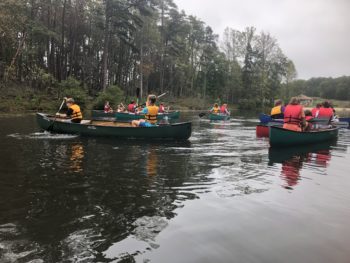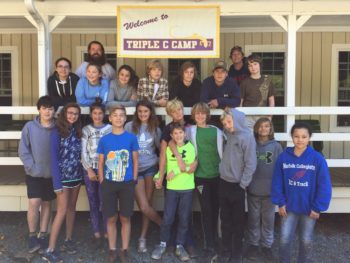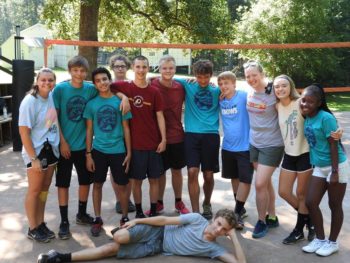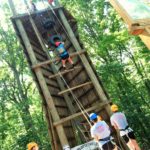Camp has changed significantly since my first year as a Counselor in 1989. Advancements in camp are amazing. Examples include: online registration, drones shooting video footage, cool fun water tramps and climbing devices, Overnight Camps have shorter sessions, and Day Camps Programs growing in numbers every summer. The biggest advancements across the industry are not as obvious. The focus on child development has become the priority for camps that want to positively impact children’s lives.
When I became a director in 1990 (Overnight; Camp Menominee, Eagle River, WI) and Camp Owner 1999 (Day; Triple C Camp, Charlottesville, VA) it was clear there needed to be intentional strategies to support counselors with camper behaviors. By ’99 stereotypically, more campers were acting out and our staff recognized that younger children needed a “camp oriented” plan for discipline support. We found male camper’s parents were turning to medicine to treat their child’s poor behavior vs. problem solving strategies.
When campers want to be at camp (especially overnight camp), there is little need for discipline. They are excited to be involved in the activities and follow their Counselors and the camps’ direction. Many become strong leaders through this healthy environment. Campers get positive attention and love the experience. These campers are normally described by their Counselors as, “these campers are great.” “Great Campers” pay attention, follow directions and want to be good friends to the other campers and staff. However, there are times when any of us could behave imperfectly and it is critical for camps to have a strategy regarding discipline. What’s the plan?
Discipline defined: the practice of training people to obey rules or a code of behavior, using punishment to correct disobedience.
As camping professionals, we need a plan. John Wooden said, “Failing to Plan is planning to fail.” There are a number of camps that choose to operate “by the seat of their pants/without a plan.” Whether it is a plan for discipline, intentional direction for staff about child development, or program schedules. Many directors allow Counselors to “wing it.” Having a plan puts Directors and frontline staff on the same page. There can always be flexibility within the plan; however a starting point is a must. When it comes to discipline, Counselors are in the trenches trying hard to do great work with the campers as their Director desires, however did the Director set staff up for success with an intentional plan?
The strategy below has evolved and worked at our camps for the last 25+ years. It is not perfect, however it is a plan. Have a plan for your staff, role play and teach staff how to use this or any strategy and they will be better prepared to execute.
Priority #1 in positive discipline: make a huge deal out of positive behaviors. Bob Ditter refers to “Connect before you redirect.” Connecting could be a respectful friendly touch, a nod of the head, or an empathetic look, you can use your own strategies, JUST HAVE A PLAN. This is critical in the relationship between camper and staff. Making a connection builds clout with campers when things go imperfectly and they will! When campers meet their Counselors for the first time, it should be celebration for both. Staff are super excited to finally be with campers they have been trained to grow and develop emotionally, mentally and physically. Campers will be excited and nervous to learn about this great leader they have been promised. Counselors need to be proactive in this moment when they meet. Energy, excitement and fun from the staff will instantly let campers know their Counselors are interested in them and will quickly become friends. Also, have your staff welcome with fun visual statements such as name tags, decorations, and fabulous first hour activities including name games help with building relationships at the very beginning. You may ask what this has to do with discipline. When staff are connected to the campers and there is a mutual respect, the need for discipline is minimal.
Positive words have an enormous effect on humans. When someone in charge asks someone to do something, we put into our heads the expectation, very often in the form of a picture. When a person gets asked not to do something, we also put a picture in our head. This is when it can get confusing. If I’m the person in charge and supervising you and say to you, “Please close your eyes and DON’T THINK OF A PINK ELEPHANT!” Did you just think? When we ask a child to NOT DO SOMETHING, why do we expect them to comply? For example, a camper is standing on a picnic bench. Staff says, “Get off the bench!” What does the camper want to do, stand on the bench more. If the staff member says, “Please put your feet on the ground.” The staff member will see much better results from the campers. Be intentional with this training. It takes a lot of practice to become permanent.
There is always a possibility of a camper acting imperfectly! What do we do?
Campers are looking for attention. What type of attention and how we give it to them is ultimately up to staff. Train your staff to make a huge deal out of the positives with campers and to deal with the negatives, do not make a big deal out of the negatives. Campers will fulfill the expectations we set for them. During the first hour or two at camp, make sure that campers are clear on behavior expectations and that staff are clear how to positively reinforce. Make use of the documents such as 100 ways to praise a child. Distribute them during staff training and role play behaviors and expectations.
When a child makes a choice different from what is in his/her best interest and your staff observes said choice, teach staff how to redirect the behavior to a more positive focus. If Johnny is throwing rocks in the creek, and the desired behavior is looking for salamanders, Counselor could say, “Johnny, please come over and help lift this rock and let’s see what’s under it.” Most of the time redirection like this will accomplish the goal of getting the camper back on track. You will notice that the Counselor never said anything about the negative choice (throwing rocks). Staff should focus on the desired behavior. Based on how the Counselor has built a relationship with Johnny before this incident will be a factor/determination how Johnny responds. When we have respect toward campers and they respect staff, redirecting takes place easily without conflict. If a staff member gets push back, it may be due to a lack of respect from the camper. Staff must respect all campers and work on “connecting before redirecting.” The child also may be looking for negative attention and not want to do as the Counselor requested. When this happens, we challenge the staff to NOT mention the negative behavior. Focus on the desired behavior.
If Johnny ignores the Counselor and is still throwing rocks in the creek, we offer Johnny choices. Still never mention throwing rocks, the Counselor would say, “Johnny, you have a choice to make, please come over and help with lifting these rocks and looking for salamanders, or you will have a time out. It is your choice.” We believe in short in sight timeouts. For some campers one minute is sufficient. If Johnny refuses the desired behavior, then the staff member MUST FOLLOW THROUGH and put Johnny in time out. Pick a location that is close where the Counselor can see Johnny and where he will not be a distraction for the rest of the group. After a minute or two, go over and talk with Johnny. Still never mentioning that he was throwing rocks and try to build back a connection that may have been lost by Johnny’s choice to take a time out. Get Johnny back to the desired activity with the other campers as soon as possible and reinforce the next positive action Johnny has to build back so staff can build back anything they may had lost with Johnny.
If Johnny continues to throw rocks in the creek and ignores the Counselors direction for time out (rarely gets this far with kids who want to be at camp), then we give Johnny more choices. “Johnny, please sit on that stump in time out, or you will see the Director. It’s your choice.” Sub consciously the Director is a direct line and contact to Johnny’s parents or family. Again, if Johnny does not make a choice, then the Counselor MUST FOLLOW THROUGH and involve the Camp Director. This allows for the Counselor to focus on the campers that want to have a fun time with the rest of the group and a camper who is looking for negative attention will receive support from the Director so that we can reset expectations with said camper. The Director will go through the stages of conflict resolution with the child and make the Counselor aware of what took place. The Counselor MUST have the support of his/her Director for success. Once the Director has spoken to the child, the camper needs to make restitution with the Counselor or possibly other campers. Tip: Director comes to area where child was misbehaving. If camper has to make the long walk to the office, they may forget the reason they were in trouble or be apologizing all the way.
If two campers are having verbal or physical difficulties, a different approach can be used. First, if campers have made physical contact with each other in a hurtful way, we want the Director to be aware and discuss the plan. We train staff to work it out with the campers; this empowers the staff to focus on group relationships. If two campers are getting on each other’s nerves, staff must keep their eyes and ears open and possibly direct campers to physically put some distance between them short term. Long term, we need to learn how to work with each other. In life individuals must recognize each other’s differences and embrace the other for differences. When campers cannot work out their differences this is when a staff member/Director can help them work through their issues. Very often this skill is beyond that of our teen age or young 20’s staff. Utilize an experienced director and communicate appropriately with parents. When campers return, the group should be addressed. The group should discuss problem solving and choices we make that have real consequences. Processing the experience is an important part of the process.
None of us are perfect. We as Directors must support our staff while working with difficult/all campers. We must partner with parents to help campers grow and develop and understand issues of attention seeking, gaining friendships, and skill development. When imperfect moments arrive, stay the course and support our Counselors. Give them a plan and expect it to be executed. Hold staff accountable to the plan as it is in the best interest of the campers you serve. Then, positively reinforce your staff. We must practice what we are teaching. Camp will be a better place for the campers when you positively reinforce, have a plan for discipline, and staff/campers are aware of expectations and that you as the Director will follow through.
Howard “H” Rothenberg is an ACA Visitor and Co-Owner and Director of Franchise Operations for Hi Five Sports Franchising, Owns Camp Coach (www.campcoach.com) and co-owner of Triple C Camp in Charlottesville, VA. www.tripleccamp.com Reach “H” about anything camp: [email protected]












